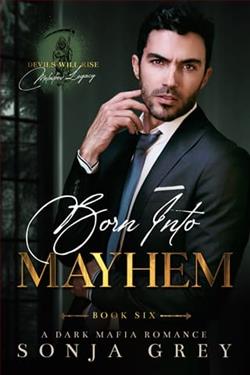Page 140 of Foul Days
* * *
Kosara looked for Asen everywhere. He wasn’t in the hospital, thank God. She didn’t find him in the Botanic Gardens, or in the park.…
She walked faster and faster, kicking at the snowdrifts. It only made her fit in better with the few people still out in the streets. It would start getting dark soon. Everyone was in a hurry.
Asen had proven he could take care of himself, but Kosara still worried. What if the upirs found him by following the smell of his leg wound? What if the karakonjuls sniffed him out and came back to finish what they’d started?
Finally, just as she passed a group of schoolchildren exchanging vials of holy water for cigarettes, it hit her. Asen had told her his wife had been buried in Chernograd. Oh no, you Belogradean idiot.…
Kosara nearly ran to the graveyard, sending sprays of snow into the air, her long scarf flying behind her. She wove through the tombstones, as quietly as she could, listening for waking upirs. It was almost an hour before sundown, but she wasn’t taking any risks. Her fist squeezed the aspen stake in her bag. Her skin reeked of garlic.
Soon, she found the monument, stark white against the quickly darkening sky. It was a tall, tacky thing, depicting several angels crying into their open palms, with a sappy poem carved on the slab. Nothing about this marble monstrosity suggested a witch had been buried there, let alone an aspiring architect. As far as Kosara was concerned, Karaivanov had built it to show off his wealth rather than to pay tribute to his dead daughter.
Asen kneeled at the foot of the monument: a crumpled spot of red. Kosara approached him carefully, but still made enough noise so as not to startle him. The snow crunched beneath her feet.
“Hi,” she said.
He jumped. She’d startled him, after all. Before he turned to face her, he quickly wiped his eyes with the sleeve of his coat. It came away wet, the tears glinting in between the deep pile of the wool.
“Hello,” he said hoarsely.
Kosara sat on the cold stone next to him. For a moment, Asen looked uncomfortable, as if he wanted to shuffle away from her. He didn’t. That was a good sign.
“I’m sorry,” she said quickly. Before she’d changed her mind.
He considered her for a long moment. “What are you sorry for?”
“For manipulating you. For trying to drug you.”
“And?”
“And for not trusting you to know what you’re doing. God knows you’ve shown you can take care of yourself, and, well, occasionally save my skin, too. I shouldn’t have assumed I know better.”
He nodded slowly. “And it won’t happen again?”
“Never again. Not worth the effort. You didn’t even drink the goddamned serum!”
Asen laughed and turned his bloodshot, puffy eyes towards her. “I’m sorry, too.”
“What are you sorry for?”
“For being technically right rather than morally right?”
Kosara smiled. At least he’d been listening. Suddenly, it struck her this was the second apology she’d received today. It sounded like the only sincere one.
“I should have told you about Malamir’s fingerprints,” he continued. “I shouldn’t have kept it a secret. We’re in this together, after all.”
“Why didn’t you tell me?”
“In the beginning, I didn’t know if I could trust you. Then I wanted to be absolutely sure before I accused your friend of murder. I saw how much learning that Roksana was involved hurt you, and, well, I didn’t want to do it again. Hurt you, I mean. I’m sorry.”
Kosara nodded. She extended her hand towards him. “Team?”
He smiled as he took it. “Team.”
In the distance, something creaked. It was probably just the shutters of a shop window or the door to a block of flats, but Kosara’s heartbeat quickened. It sounded an awful lot like the groaning of a coffin’s rusty hinges.
“Asen, look—”















